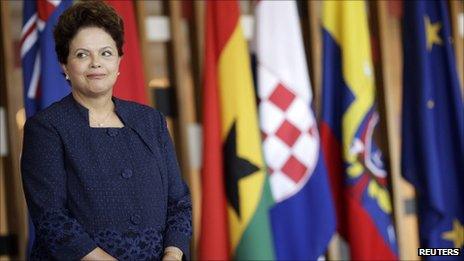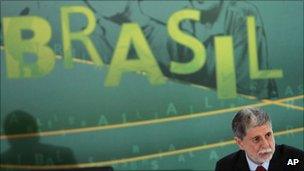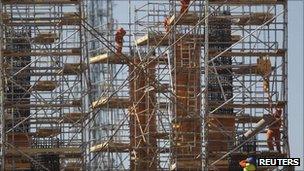Brazil's President Rousseff grapples with corruption
- Published

President Rousseff: Used to managing but this is her first elected position
Brazilian President Dilma Rousseff, just eight months in the job as her country's first female leader, is regarded as one of the world's most powerful women.
So powerful, in fact, that she only trails German Chancellor Angela Merkel and US Secretary of State Hillary Clinton in the female power list compiled by Forbes magazine., external
But international acclaim may be the last thing on Ms Rousseff's mind as she struggles with political infighting in her multi-party coalition government.
Much of the recent upheaval has been caused by allegations of corruption that date back to the previous administration.
Four ministers have resigned or been sacked since June and several others have been accused by the Brazilian media of misusing public funds. All deny any wrongdoing.
Scores of high and mid-ranking ministry officials have been fired or arrested by federal police on corruption charges.
New job, old face
Some commentators have sought to portray this as a crisis of governability, but in fact only the exit of Antonio Palocci, President Rousseff's chief of staff, was a real blow to her.
Mr Palocci resigned in June after media reports questioned his rapid accumulation of wealth. He rejected accusations of wrongdoing and said he was stepping down to avoid scandal weakening the president.

The changes have seen a return to the government frontline for Celso Amorim
After hesitating over Mr Palocci's fate, President Rousseff moved quickly to tackle subsequent emerging corruption scandals.
The exit of Transport Minister Alfredo Nascimento in July, following accusations of corrupt practices within his ministry - he also denied any wrongdoing - allowed her to promote an experienced civil servant in his place.
Getting rid of Defence Minister Nelson Jobim, who stepped down in early August after making disparaging remarks about other ministers, was in many ways a bonus for Ms Rousseff.
According to an open letter circulated by retired general Luiz Gonzaga Lessa, Mr Jobim was extremely unpopular among the armed forces.
In his place, Mr Rousseff appointed the last president's Foreign Minister, Celso Amorim, whose nationalist record is more attuned with her policies and the thinking of much of the armed services chiefs than that of the pro-American Mr Jobim.
Competing demands
The exodus of ministers has highlighted the differences between the president and her predecessor, Luiz Inacio Lula da Silva.
Lula, honed by years as a trade union negotiator, was a skilled conciliator who avoided confrontation and bent over backwards not to offend anyone.
President Rousseff, who had never stood for elected office until last year's presidential election, is known for her brusque and direct style.
For Brazilian politicians accustomed to being wooed and indulged through years of coalition governments, this has been uncomfortable new territory.
But her attempts to clean up her administration have strained her political allegiances.
Agriculture Minister Wagner Rossi resigned in mid-August after a whistle blower denounced the existence of corruption in his ministry - accusations he denounced as "false".
President Rousseff would probably have liked to replace him with a civil servant.
But the ministry belonged to the quota allocated to the Brazilian Democratic Movement Party (PMDB), the main partner in the governing alliance.
To keep the party onside she had to allow PMDB leaders to choose Mr Rossi's successor.
They opted for Mendes Ribeirio, a little-known legislator from the state of Rio Grande do Sul.
Theoretically President Rousseff has a huge majority in congress with only 96 confirmed opposition deputies, but the coalition is an unruly mass of interests.

Preparations for the 2014 World Cup are one of President Rousseff's priorities
The parties are driven, in the opinion of many political commentators, not by any fixed ideologies but more by the need to approve funds for pet projects that will benefit their electoral bases.
That is why President Rousseff needs the PMDB with their 80 deputies, 20 senators, five state governors and the Vice-President, Michel Temer, to get anything done in government.
And speaking last week, President Rousseff indicated that she did not intend to force any more ministers out.
Beyond the closed circuit of the professional politicians, however, Ms Rousseff can count on widespread popular approval for a crackdown on corruption, encouraged by the success of the "ficha limpa" or clean record law.
This was passed last year, after campaigners collected more than a million signatures demanding that people standing trial for corruption should not be allowed to run for office.
Anthropologist Roberto Da Matta says this support represents "indignation with the fact that while Brazil improves, it still doesn't manage to do anything about corruption.
"Governments come and go, right-wing, centrist, left-wing, Lula, now Dilma, and everything continues the same."
History's lesson?
President Rousseff's dilemma is that however keen she may be to clean up politics, she also needs the parties' support to introduce badly needed tax and fiscal reforms to modernise Brazil and maintain growth.
Speeding up preparations for the forthcoming World Cup and Olympic Games is also a priority.
Ms Rousseff has to reconcile these often conflicting, demands. The question which hangs over her presidency is whether this is possible.
If she succeeds, even in a small way, she will be a serious contender for re-election in 2014.
If she fails, then the road might be open for Lula to run again.
Or another populist may emerge vowing to sweep away corruption at all costs, as ill-fated presidents Janio Quadros and Fernando Collor de Mello tried to do.
The former renounced the presidency, triggering a constitutional crisis; the latter resigned ahead of his impeachment - for corruption.
In a country where memories are short, the danger of repeating history is always present.
- Published2 January 2011
- Published1 January 2011